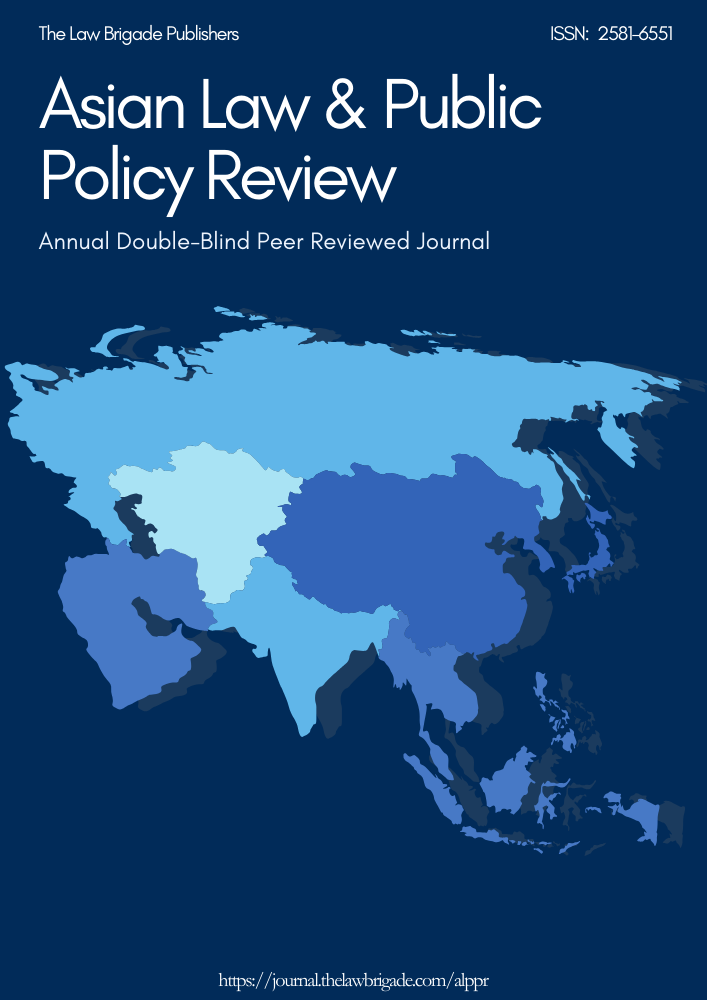THE ARBITRATION & CONCILIATION (AMENDMENT) ACT 2019: GOOD INTENTIONS, BAD OUTCOMES
Downloads
DOI:
https://doi.org/10.55662/ALPPR.2020.511Keywords:
Arbitration, Conciliation, international arbitrationsAbstract
The arbitration jurisprudence in India has been ever evolving since the enactment of the Arbitration and Conciliation Act, 1996 (“the Act”), with judiciary as well as the legislature contributing immensely to its development. After the round of amendments in 2015, there was a need felt for another round of amendments to rectify some of the mistakes made in 2015 as well as to push the case of institutional arbitration in India, which has been ignored for a long time. It is in this context and based on recommendations of a high-level committee that the legislature introduced the Arbitration & Conciliation (Amendment) Act 2019, which has since partially come into force on 9th August 2019 and has made a flurry of changes to the existing arbitration jurisprudence and structure in India. Whilst most of these changes have been made with good intentions to promote institutional arbitration in India and to make India an attractive destination for international arbitrations, some of these changes are bound to have the opposite effect and adversely affect the progress of arbitration as a means of dispute resolution in India. In this paper, we will analyze the major changes made to the Act by the Arbitration & Conciliation (Amendment) Act 2019 and study its possible outcomes on the current arbitration jurisprudence in India.
External References to this Article
Loading reference data...
References
i The Act was amended in 2015 for undoing the effect of certain bad judicial precedents, limiting judicial
intervention and strengthening the arbitration jurisprudence by making it more liberal and progressive.
ii The Arbitration and Conciliation (Amendment) Bill 2018 was initially tabled in Lok Sabha on 10th August 2018.
However, passing of the same was delayed due to the lapse of the 16th session of the Lok Sabha.
iii The Amendment Act was introduced as Arbitration and Conciliation (Amendment) Bill in Rajya Sabha (Upper
House if Indian Parliament) on 15th July 2019. Thereafter, it was first passed by Rajya Sabha on 18th July 2019
and then by Lok Sabha (Lower House of Indian Parliament) on 1st August 2019 and later received the assent of
the President of India on 9th August 2019 and was subsequently published as Act No. 33 of 2019 in the Gazette
of India.
iv Except Sections 2, 3, 10, 14 and 16, all the Sections of the Amendment Act have been notified on 30 August
2019
v The Government of India had appointed a High-Level Committee was under the Chairmanship of the Hon’ble
Mr. Justice B. N. Srikrishna (Retired). The Committee submitted its report to the then Law Minister of India, Mr.
Ravi Shankar Prasad, on 30th July 2017.
vi Part 1A, Sections 43A to 43M inserted by the Amendment Act
vii The ACI is a body corporate with Head Office in New Delhi.
viii Section 43C inserted by the Amendment Act
ix Section 43D (1) & (2) inserted by the Amendment Act
x Section 43D & 43I inserted by the Amendment Act
xi In India, the Government is the biggest litigator. The Government companies are part of major national and
international arbitrations in India.
xii Section 43D (2) (j) inserted by the Amendment Act
xiii The term ‘arbitration institution’ is defined by inserting Section 2 (1) (ca) to the Act by the Amendment Act.
xiv arbitral institution designated by the Supreme Court or a High Court under the Act
xv By inserting Section 11 (3A) to the Act.
xvi Prior to the Amendment Act, the power of appointment of arbitrator/arbitral tribunal was with the concerned
High Court in case of domestic arbitration and Supreme Court of India in case of International Commercial
Arbitration. Under the Amendment Act, the concerned High Court will designate and grade arbitration institution
for domestic arbitration within its jurisdiction and Supreme Court of India will designate and grade arbitration
institution for international commercial arbitration
xvii The panel of arbitrators will be maintained by the Chief Justice of concerned High Court
xviii Singapore’s International Arbitration Act provides for only Singapore International Arbitration Center
(SIAC) as appointing authority, and Hong Kong’s Arbitration Ordinance provides for only Hong Kong
International Arbitration Center (HKIAC) as appointing authority.
xix One Supreme Court of India and twenty-nine High Courts with their own territorial jurisdiction.
License Terms
Ownership and Licensing:
Authors of research papers submitted to any journal published by The Law Brigade Publishers retain the copyright of their work while granting the journal specific rights. Authors maintain ownership of the copyright and grant the journal the right of first publication. Simultaneously, authors agree to license their research papers under the Creative Commons Attribution-ShareAlike 4.0 International (CC BY-SA 4.0) License.
License Permissions:
Under the CC BY-SA 4.0 License, others are permitted to share and adapt the work, even for commercial purposes, provided that appropriate attribution is given to the authors, and acknowledgment is made of the initial publication by The Law Brigade Publishers. This license encourages the broad dissemination and reuse of research papers while ensuring that the original work is properly credited.
Additional Distribution Arrangements:
Authors are free to enter into separate, non-exclusive contractual arrangements for distributing the published version of the work (e.g., posting it to institutional repositories or publishing it in books), provided that the original publication by The Law Brigade Publishers is acknowledged.
Online Posting:
Authors are encouraged to share their work online (e.g., in institutional repositories or on personal websites) both prior to submission and after publication. This practice can facilitate productive exchanges and increase the visibility and citation of the work.
Responsibility and Liability:
Authors are responsible for ensuring that their submitted research papers do not infringe on the copyright, privacy, or other rights of third parties. The Law Brigade Publishers disclaims any liability for any copyright infringement or violation of third-party rights within the submitted research papers.
Citation Metrics
Published
Issue
Section
License

This work is licensed under a Creative Commons Attribution-NonCommercial-ShareAlike 4.0 International License.
Copyright © 2026 by Abhijeet Sadikale
The copyright and license terms mentioned on this page take precedence over any other license terms mentioned on the article full text PDF or any other material associated with the article.






